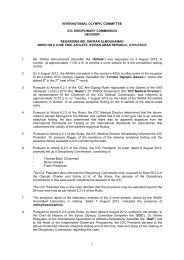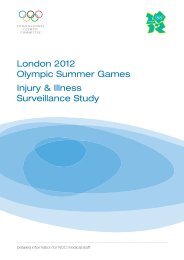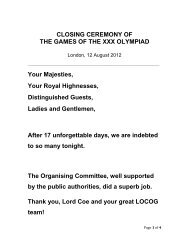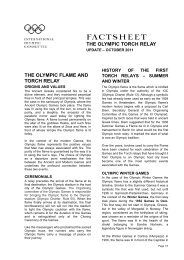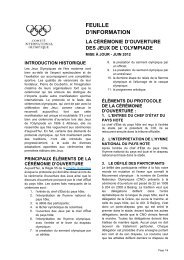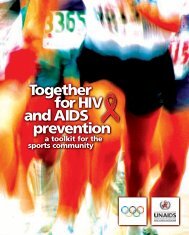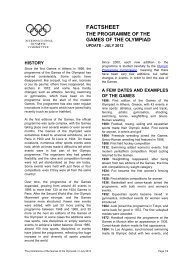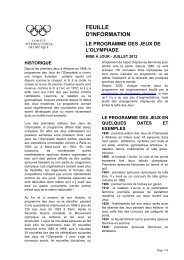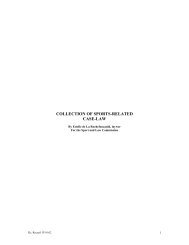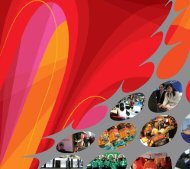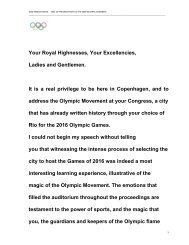8th WORLD CONFERENCE ON SPORT AND THE ENVIRONMENT
8th WORLD CONFERENCE ON SPORT AND THE ENVIRONMENT
8th WORLD CONFERENCE ON SPORT AND THE ENVIRONMENT
You also want an ePaper? Increase the reach of your titles
YUMPU automatically turns print PDFs into web optimized ePapers that Google loves.
<strong>8th</strong> World Conference on Sport and the Environment<br />
International Cooperation and Development Department<br />
Mr Michael Fennell,<br />
President, Commonwealth Games Federation, Jamaica<br />
Report<br />
Mr Fennell picked up from the previous presentation and continued the discussion on the individual<br />
impact on issues of sustainability. The Commonwealth Games Federation also has to assess its<br />
role in the sphere of sustainability and fi gure out how to approach the Games with special focus<br />
on respecting and sustaining the environment.<br />
Mr Fennell discussed the Pune India Environment Programme in which 71 countries participated<br />
and partnered up with over 1,300 athletes. Athletes and countries focused on sustainable issues<br />
and used the 3rd Youth Games to evoke participation from young people regarding sustainability<br />
related issues.<br />
The general perception around the world is that developing countries do not pay attention to the<br />
environment, but this is not the case in Delhi.<br />
Mr Fennell guarantees that conversation and environment will remain paramount and will remain<br />
an important part of the Commonwealth Games and the Federation.<br />
Prof. Erich Vogt,<br />
Professorial Lecturer, American University, USA<br />
Prof. Vogt feels that the collective consumption path we are on is suicidal. If this crisis tells us<br />
anything, he states, it is that the planet is truly globalised and interdependent.<br />
“Like it or not, we are one people and we live off our planet’s natural and limited resources.”<br />
Professor Vogt goes on to say that we continually treat the environment and the economy as<br />
mutually exclusive, which is detrimental. “We can no longer address one and then the other, we<br />
must address them together, nor can we address one over another.”<br />
Professor Vogt then adjusted his somewhat pessimistic tone into one of optimism stating that<br />
the fi nancial crisis we face is unparalleled but that also creates unparalleled opportunities for<br />
ecological conservation and sustainability. “If we do this right and fi gure out how to infl uence the<br />
evolving rules of the games, we have an opportunity to jumpstart the process.”<br />
Professor Vogt focussed on fi nancing as being an integral part of producing and implementing<br />
ideas. Even the best ideas will not see the light of day without proper fi nancing. Thus, we have to<br />
turn the World Bank into the World Environment Bank.<br />
Professor Vogt briefl y touched on the nagging issues of doping – stating that doping issues<br />
continue to affect the sport and our legitimacy and in order to move on we have to clean our<br />
backyard fi rst.<br />
Discussion:<br />
The question and answer period began with a series of questions from the moderator Ms Amy<br />
Fraenkel, followed by a few questions from the audience.<br />
Ms Fraenkel opened the discussion by asking Deputy Minister Konkin how he felt governments<br />
can get the sustainability message out to the general, uninformed public.<br />
Page 30 / 80





